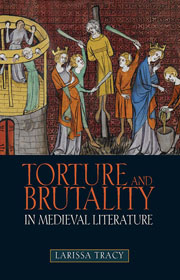Book contents
- Frontmatter
- Contents
- Acknowledgements
- Abbreviations
- Introduction
- 1 Rending the Flesh: The Orthodoxy of Torture in Hagiography
- 2 Resisting the Rod: Torture and the Anxieties of Continental Identity
- 3 The Matter of the North: Icelandic Sagas and Cultural Antonomy
- 4 The Matter of Britain: Defining English Identity in Opposition to Torture
- 5 Laughing at Pain: The Comic Uses of Torture and Brutality
- 6 Medieval Torture and Early-Modern Identity
- Conclusion
- Select Bibliography
- Index
Conclusion
Published online by Cambridge University Press: 05 September 2013
- Frontmatter
- Contents
- Acknowledgements
- Abbreviations
- Introduction
- 1 Rending the Flesh: The Orthodoxy of Torture in Hagiography
- 2 Resisting the Rod: Torture and the Anxieties of Continental Identity
- 3 The Matter of the North: Icelandic Sagas and Cultural Antonomy
- 4 The Matter of Britain: Defining English Identity in Opposition to Torture
- 5 Laughing at Pain: The Comic Uses of Torture and Brutality
- 6 Medieval Torture and Early-Modern Identity
- Conclusion
- Select Bibliography
- Index
Summary
In the modern mind, torture has become inextricably linked to the medieval world. As modern civilization grapples with reports of abuses that include interrogatory torture from powers great and small, the concerns of medieval authors regarding judicial practices in their own time become particularly relevant. We look back on the medieval world armed with assumptions of alterity and Otherness, qualifying and defining a world of which we have only glimpses. In these circumstances, the wide range of medieval literary sources become invaluable tools for evaluating cultural responses to societal and judicial practice. Torture is notorious now, but it was also notorious then; its application coupled with scenes of excessive brutality often colours narratives against those who resort to such drastic and extreme measures and question the definitions of national identity. Even in literary texts that espouse orthodox ideologies, such as the extensive corpus of medieval hagiography, torture is an anathema; it is the weapon of pagan persecutors wielded against the faithful who stand steadfast and endure. Similarly, these narratives have the potential to turn on the propagators of violence, potentially providing tools for resisting Church authority in the struggle over heterodoxy. Religious literature and iconography are rife with images of broken and tortured bodies, bodies that cry out against the torment inflicted by illegitimate authorities and challenge the justice in applying torture as a means of ‘discovery’.
From sparse twelfth-century roots, torture was introduced into European jurisprudence in the thirteenth century with the ‘rediscovery’ of Roman law.
- Type
- Chapter
- Information
- Torture and Brutality in Medieval LiteratureNegotiations of National Identity, pp. 292 - 298Publisher: Boydell & BrewerPrint publication year: 2012



